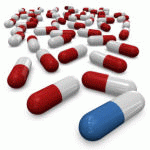Pharmacology
|
19 june 2018 10:00:26 |
| Marine Drugs, Vol. 16, Pages 204: Heteronemin, a Marine Sesterterpenoid-Type Metabolite, Induces Apoptosis in Prostate LNcap Cells via Oxidative and ER Stress Combined with the Inhibition of Topoisomerase II and Hsp90 (Marine Drugs) |
|
Tweet Heteronemin, a marine sesterterpenoid-type natural product, possesses diverse bioactivities, especially antitumor effect. Accumulating evidence shows that heteronemin may act as a potent anticancer agent in clinical therapy. To fully understand the antitumor mechanism of heteronemin, we further explored the precise molecular targets in prostate cancer cells. Initially, heteronemin exhibited potent cytotoxic effect against LNcap and PC3 prostate cancer cells with IC50 1.4 and 2.7 ?M after 24 h, respectively. In the xenograft animal model, the tumor size was significantly suppressed to about 51.9% in the heteronemin-treated group in comparison with the control group with no significant difference in the mice body weights. In addition, the results of a cell-free system assay indicated that heteronemin could act as topoisomerase II (topo II) catalytic inhibitor through the elimination of essential enzymatic activity of topoisomerase II? expression. We found that the use of heteronemin-triggered apoptosis by 20.1-68.3%, caused disruption of mitochondrial membrane potential (MMP) by 66.9-99.1% and promoted calcium release by 1.8-, 2.0-, and 2.1-fold compared with the control group in a dose-dependent manner, as demonstrated by annexin-V/PI, rhodamine 123 and Fluo-3 staining assays, respectively. Moreover, our findings indicated that the pretreatment of LNcap cells with an inhibitor of protein tyrosine phosphatase (PTPi) diminished growth inhibition, oxidative and Endoplasmic Reticulum (ER) stress, as well as activation of Chop/Hsp70 induced by heteronemin, suggesting PTP activation plays a crucial rule in the cytotoxic activity of heteronemin. Using molecular docking analysis, heteronemin exhibited more binding affinity to the N-terminal ATP-binding pocket of Hsp90 protein than 17-AAG, a standard Hsp90 inhibitor. Finally, heteronemin promoted autophagy and apoptosis through the inhibition of Hsp 90 and topo II as well as PTP activation in prostate cancer cells. Taken together, these multiple targets present heteronemin as an interesting candidate for its future development as an antiprostatic agent. |
| 39 viewsCategory: Biochemistry, Molecular Biology, Pharmacology |
 Marine Drugs, Vol. 16, Pages 205: Absolute Configuration Determination of Retroflexanone Using the Advanced Mosher Method and Application of HPLC-NMR (Marine Drugs) Marine Drugs, Vol. 16, Pages 205: Absolute Configuration Determination of Retroflexanone Using the Advanced Mosher Method and Application of HPLC-NMR (Marine Drugs)Marine Drugs, Vol. 16, Pages 203: Exploring the Valuable Carotenoids for the Large-Scale Production by Marine Microorganisms (Marine Drugs) 
|
| blog comments powered by Disqus |
MyJournals.org
The latest issues of all your favorite science journals on one page
The latest issues of all your favorite science journals on one page



